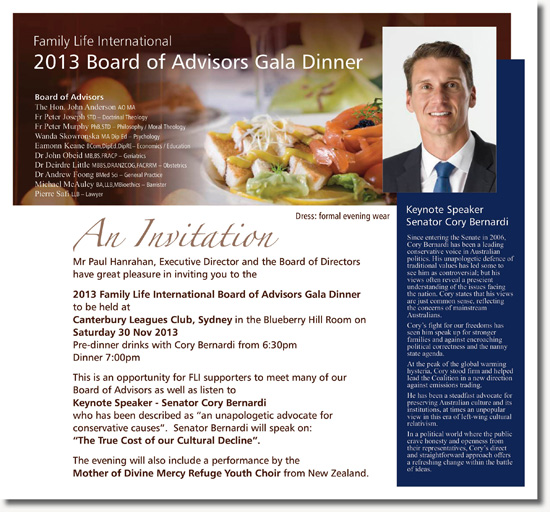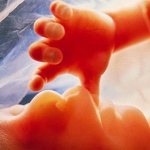Board of Advisors Gala Dinner 2013

Board of Advisors Gala Dinner 22 February 2014
‘The true cost of our cultural decline’
Introduction
Judging from the recent media reports about me, you’ll know that I’m not your typical politician.
In fact, it’s been said that I’m:
- “a person without any intellect”…
- a “homophobic, Islamophobic, climate-change-denying, free-market Christian fundamentalist” and…
- …”Sarah Palin, without the lipstick.”
Some may think that’s true, but in the end what people wish to say and believe about me is their business.
What I know is that barbs like that will never deter me from being a principled and conservative politician.
And it won’t stop me from talking about the uncomfortable truths that a vocal minority don’t want anyone to discuss.
The challenge
Because if silence is the standard reaction society adopts on important issues of concern, then the politically correct brigade has already won.
And letting the PC tyrants – those who seek to undermine our critical values and principles – win only brings deliberate erosion of the foundations and institutions that have served us so well.
At times it can seem that defending our values is an insurmountable challenge.
Thankfully, meeting that challenge is made easier by like-minded people such as yourselves and groups like Family Life International.
The work of this organisation and the efforts of its supporters are vital tools in safeguarding the wellbeing of our society.
And for me personally, whenever I stick my neck out on social matters it’s a great reassurance to know that they are many Australians that share my views.
Like you, I will not be shamed into thinking that less abortions, stronger families and a greater respect for values are not things worth fighting for, because as Martin Luther King Jr said:
“Our lives begin to end the day we become silent about things that matter.”
There is a lot at stake if we fail to stand up for life, family, freedom and Christian values.
While we often see the true cost of our cultural decline, we still have a duty to defend all that we hold to be right and true.
Influence of Christianity
Because what we stand for is worth defending.
Christian teaching is woven in the very fabric of our country’s foundation.
If you’re the Greens you try to deny that as much as possible, but no amount of arguing or protests will ever alter the fact that our society has Judeo-Christian roots.
The Father of Federation, Henry Parkes, acknowledged that “as we are a British people, we are pre-eminently a Christian people – as our laws, our whole system of jurisprudence, our Constitution – are based upon and interwoven with our Christian belief.”
Our ethical and moral standards are informed by the teachings of Christ, based particularly on the golden rule of ‘love your neighbour as you love yourself’.
Our ideas of compassion, respect, tolerance, equality for all under the law – those ideas that thrive even in today’s secular world – have a Christian influence.
The principle of human rights – that simply because we are human we have basic rights that should be protected by law – is founded in the Christian belief that rights come from God.
Even the secular trophy of the ‘separation of church and state’ (that Greens Senator Di Natale relied on recently in his attempt to remove parliamentary prayers) is based on the Christian idea of rendering unto Caesar what is his and rendering unto God what is God’s!
Plus Christianity as a source for good is evident in the long history that churches – particularly the Catholic Church – had in providing schools and hospitals and services for those less fortunate.
So doesn’t it seem a bit counter-productive for the secularists to be so intent on removing Christianity from society when by doing so they will effectively demolish the very basis of their own secularism?
Theodore Roosevelt put it well:
“Every thinking man … realises what a very large number of people tend to forget, that the teachings of the Bible are so interwoven and entwined with our whole civic and social life that it would be literally … impossible for us to figure to ourselves what that life would be if these teachings were removed. We would lose almost all the standards by which we now judge both public and private morals; all the standards towards which we, with more or less of resolution, strive to raise ourselves.”
None of what I’m saying here is new yet it seems to have been lost from mainstream thought in recent times.
But no matter what challenges may come in the future, we stand strong knowing that we are defending a belief, values and principles that are at the centre of our nation.
Life
One of those challenges we face is the attempt to devalue human life.
When talking about the constant legislative push for euthanasia and abortion, my friend Paul Russell, Director of HOPE, has said all the other side has to do is win once; just once, and they’ve claimed their victory. We, on the other hand, have to win every single time to beat back the advancing culture of death in our society.
It is a constant struggle and it attacks both ends of the life spectrum.
With abortion, embryonic stem cell research, euthanasia and even the infanticide advocated by the likes of Peter Singer, the window of life that isn’t being threatened is sadly getting smaller.
Peter Singer’s advocacy is particularly concerning because his is a sinister push to extend the pro-abortion argument to babies that have been born.
He determines that if we already abort unborn children with disabilities, why can’t we kill disabled infants that have been born, if the parents don’t want the child?
He concludes: “…killing a disabled infant is not morally equivalent to killing a person. Very often it is not wrong at all.”
Remember, this is a man who has received one of our nation’s highest honours, the Order of Australia.
And alarmingly, some Australian university academics have extended Singer’s thoughts even further by saying that killing a newborn child – with or without a disability – is not immoral.
What a callous and sickening argument.
Any person of sense that heard that would be absolutely appalled.
Such ideas need to be aired and exposed for the absolute nonsense they are.
Some may argue that it’s just the thoughts of a few people; nothing to worry about.
But left unchallenged, there is a danger that ideas like this could make their way into mainstream advocacy.
We can’t afford to let ideas like this go unchallenged in the public space.
Free speech allows us all – even the Peter Singers of the world – the privilege of expressing opinions so we shouldn’t call for opposing views to be silenced. But we have every right to meet their arguments with our own.
In the end, I don’t know anyone who wants to see more abortions.
Indeed, our own Prime Minister has said that “every abortion is a tragedy, and up to 100,000 abortions a year is this generation’s legacy of unutterable shame.”
Back when abortion was decriminalised, who could have foreseen that things would reach that scale?
It’s the same with euthanasia.
This month, just 12 years after introducing euthanasia for adults, the Belgian parliament voted to allow euthanasia for children.
Who would have thought that it would get to that stage in just 12 short years?
This shows that we are right to question the leftist ‘progressives’ when they seek change in our society.
Because every push they make opens the door to all number of adverse consequences.
It’s often said that the true measure of a society lies in how it treats its most vulnerable.
What does it say about our society then, if the most vulnerable – the unborn, the ill and the elderly – are at the forefront of the push to destroy life?
We shouldn’t be destroying human dignity and forcing people to question their own self-worth.
We need to foster a culture of life because the right to life lies at the very heart of the well-being of society.
Family
The family unit is instrumental in fostering a culture of life in society; by providing a safe and secure place to nurture and instilling important values in future generations.
The family is a mini welfare state, providing support and encouragement that governments across the world can only hope to replicate. It is a structure that provides so many benefits to individuals and society as a whole.
Yet strangely, defending the traditional family can get you in hot water these days.
It’s almost as if the critics don’t want to see stronger families, less parental conflict and less family breakdown!
Recent decades have seen the weakening of the marriage bond and the rise of no fault divorce.
I know that there are cases of divorce that are caused by more serious issues like domestic violence and abuse but no one can deny that in some other cases, our human desire to take the easy route trumps everything else.
The ending of a family unit is never painless and in many cases it’s the kids that bear the brunt of the fallout.
I am not the first person to point this out (although judging by the reaction earlier this year, you’d think that I was the only person out there speaking about family structure and its outcomes).
Australian university studies show that family breakdown is a major cause of poverty and that divorce often leaves both people worse of economically.
There are many other studies overseas and in Australia that conclude that children on average fare better when they grow up in an intact family with their married, biological mother and father.
Now, in citing the evidence and advocating for the traditional family, I am not making a moral judgment on other family structures.
In my writings I make it very clear that there are non-traditional families that do a wonderful job of raising kids while some married mums and dads are terrible parents.
But on the whole, the best situation for kids and one that we should always strive for is for them to be raised in a family with their biological parents.
I’m looking at this issue from a public policy standpoint: What are the best policies that our government should be implementing to foster stronger families?
And much of the evidence points to the traditional family.
One of the most comprehensive studies in Australia was carried out in 2011 by Professor Patrick Parkinson of the University of Sydney.
One of Parkinson’s main conclusions was that:
If there is one major demographic change in western societies that can be linked to a large range of adverse consequences for many children and young people, it is the growth in the numbers of children who experience life in a family other than living with their two biological parents, at some point before the age of 15. (p8)
He continues:
Children whose parents live apart are also exposed to a greater number of risks and difficulties than children in intact families. They are significantly more likely to be subject to reports of abuse and neglect than intact families. (p9)
Professor Parkinson noted that, of course, there are additional reasons for the problems faced by Australian kids – with income levels and economic forces playing a role.
When this report came out, there was some discussion in the mainstream papers about it, but not much. It seemed to slip below the radar.
When I raised similar issues, there was a level of interest but it was often negative in nature.
Why are people so intent on either silencing or misrepresenting this important discussion about the impact of family breakdown on kids?
It’s a sad reflection of the stifling nature of political correctness.
Family breakdown is an uncomfortable truth that the Left prefer to keep hidden from public debate.
Dr Jeremy Sammut from the Centre for Independent Studies summarises it well when he says:
Australian governments already conduct advertising campaigns such as anti-smoking and anti-drink driving campaigns to educate citizens, promote certain values, and change attitudes and behaviours. A public information campaign that advertised the risks to children posed by family breakdown would end the new silence that hides the culturally unfashionable truth.
Even Barack Obama – the Left’s leading figure – said in 2008 that:
“…children who grow up without a father are five times more likely to live in poverty and commit crime; nine times more likely to drop out of schools and twenty times more likely to end up in prison. They are more likely to have behavioural problems, or run away from home, or become teenage parents themselves. And the foundations of our community are weaker because of it.”
Those words were actually a footnote in my book but that didn’t stop the perpetually outraged from having a go.
Apparently, according to critics – including some in my own party – my views were “offensive,” “a lack of genuine Christianity” and even as abhorrent as Pauline Hanson’s.
Warren Entsch said I had an “obsession” with gay people and even implied that I was homosexual myself.
If this is what passes for political debate in this country, then that’s a very sad indictment on Australian politics.
These decibels of outrage continued until I mentioned to the journalist Paul Sheehan that I was only referring to Obama’s words.
It seems that Obama can do no wrong and is lauded as a political visionary yet when a conservative repeats his exact words, that conservative is hauled over the coals as some sort of intolerant monster.
One can only marvel at the astounding level of duplicity among the Left.
My argument here is not about forcing Australians to live the way I think is best.
My aim is to make people aware of the evidence and to cultivate discussion about what is best for the quality of life in Australia.
By reinforcing adult relationships and advocating for stronger families, we can go some way to reducing family breakdown and the impact it can have on children.
Freedom
Another front in the true cost of our cultural decline is freedom – particularly freedom of religion and freedom of speech.
Political correctness and the ‘new tolerance’ – that only tolerates those views that conform to a certain world view – would like to see both these freedoms trampled under the weight of silence and/or ridicule.
• The Greens tried to strip away the daily prayers from our parliament – a tradition that has been around for over 100 years.
• The University of NSW got up in arms about anti-Semitic remarks on a Facebook page (which is fair enough) but that same university refused to openly criticise its student magazine when it denigrated Christians.
• A Catholic pharmacy owner who lives out his moral objection to contraception in his store is derided and also dropped by the parent company, while a UK Muslim worker who refused to sell alcohol at Marks & Spencer seemed to escape penalty.
• Danish churches are forced to conduct same-sex marriage ceremonies even if it goes against their beliefs while churches, florists, photographers and doctors get taken to court charged with discrimination of same-sex couples.
• The right to a conscientious objection was removed for pro-life doctors in Victoria.
• There were calls to rename Margaret Court Arena in Melbourne, simply because of Margaret Court’s views on same-sex marriage.
• The conservative commentator Andrew Bolt was found guilty of racial discrimination for simply commenting that a group of what he called ‘white-skinned Aborigines’ were not entitled to a certain welfare payment.
• An Australian speaking tour for an overseas politician who speaks out against Islamic fundamentalism was beset by cancellations, protests and prejudice while other speaking tours of different speakers who are also critical of Islamic fundamentalism are sponsored by our governments.
The Left will defend freedoms, as long as it conforms to their opinion.
You can criticise religion – as long as it’s just Christianity.
You can have free speech – as long as people aren’t offended by what you say.
You can defend the right to life – as long as it doesn’t’ apply to the unborn, the ill or the aged.
The relativists champion tolerance and yet are so intolerant of other points of view.
Instead of engaging in considered and meaningful debate, they resort to insults and name-calling because in this day and age, unfortunately it is those who yell the loudest that get the most attention.
Let’s consider this example:
Ask anyone on the street what the most persecuted religion in the world is and they’d probably wouldn’t say Christianity.
But in fact, it is Christianity.
Christians are the target of four out of every five acts of religious discrimination in our modern world.
They are the subject of oppression in almost 75 per cent of countries.
Yet barely a peep about this is featured in the media.
Christians don’t tend to yell the loudest so the public don’t hear about it.
It’s simply another uncomfortable truth that the Left would prefer to conceal.
Conclusion
In his keynote address to the advisors, Bishop Julian Porteous quoted the Canberra Declaration:
“Religious freedom, marriage and family, and the sacredness of human life have provided the foundations enabling Western democratic societies to flourish…The faith which is at the heart of many of the values and strengths underpinning the Australian nation now compels us to speak up in their defence.”
That’s the essence of what I’m talking about tonight.
I just hope that I haven’t painted too bleak a picture for you of the true cost of our cultural decline.
But part of the battle is understanding what you’re up against.
The relativists and ‘progressives’ of the world would prefer that we stay silent on issues about life and family and principle.
They don’t want any opposition to their introduction of euthanasia or their push for embryonic stem cell research or their desire to redefine marriage, for example.
It would be much easier for them if we just let things slide.
But I shudder to think what our world would look like if that happened.
So the best path – the right path – for us all is to stand up and defend our values and traditions in accordance with our beliefs and our conscience; to be a shining light amid the darkness of the world.
We may not be able to change all that’s transpired in the past and we may not be successful every time we meet challenges in the future but we can live as true Christians, knowing that we fight the good fight and confident in the fact that no one can ever accuse us of being ‘silent about the things that matter.’







